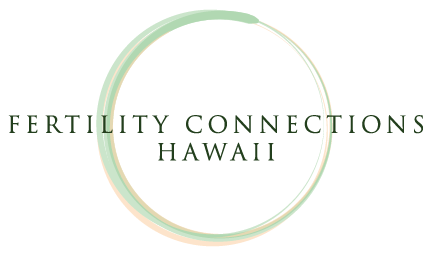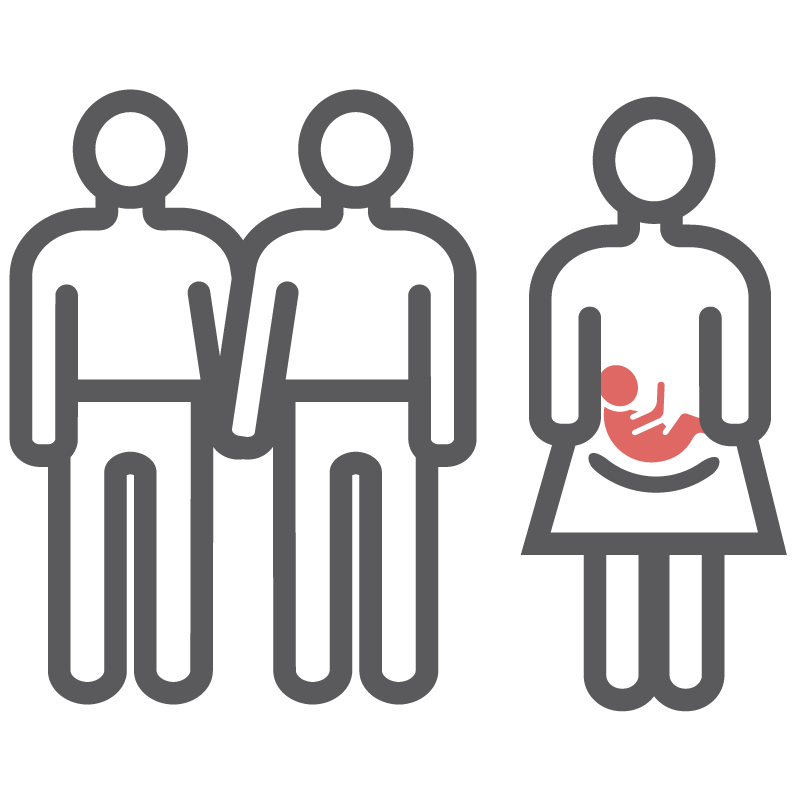Business Hours: Monday - Friday 9:00am - 5:00pm | Call Us Now: +1.808.585.1317
Business Hours: Monday - Friday 9:00am - 5:00pm

The Process
The Process
The typical surrogacy journey looks like this:
It is estimated 1 out of every 6 couples will have trouble conceiving a child and may turn to a medical professional to test and diagnose the possible causes of infertility. The U.S. Department of Health & Human Services describes “infertility” as being unable to become pregnant after one year of trying (for women age 35 and older, this time frame decreases to six months). According to the Centers for Disease Control and Prevention (CDC), approximately 10% of women in the U.S. (ages 15-44) experience difficulty becoming pregnant.
An Obstetrician-Gynecologist or a reproductive Endocrinologist (sometimes referred to as an “RE”) can help to diagnose the cause of infertility. While both physicians will perform an initial fertility test, a reproductive Endocrinologist will generally provide a more substantive infertility diagnosis.

1. Diagnosis
Intended Parents consult with a reproductive medical doctor who will discuss fertility options, conduct genetic testing, etc. to see if surrogacy is the right choice.

2. Embryos
Assisted Reproductive Technology is used to create embryos which can be used for surrogacy.

3. Matching
A surrogacy agency can match Intended Parents with an appropriate surrogate in your jurisdiction.

4. Legal
A contract between the parents and the surrogate is completed and the parties are issued legal clearance to proceed with the surrogate’s fertility cycling.

5. IVF/Embryo Transfer
The embryo transfer procedure is performed, and the surrogate becomes pregnant.

6. Birth & Legal Parentage Proceedings
The child is born and the parties proceed with the court process to establish the legal rights of the parents.
Here is a step-by-step guide of the surrogacy process, which may vary according to your state laws.

Step 1: Determine if surrogacy is right for you:
The first step is to evaluate whether surrogacy is the right choice for you and your family. Speaking with various professionals (physicians, therapists, attorneys, etc.) may help you understand and decide if it is right for you. Once you have decided that surrogacy is right for you, you should evaluate the goals and needs of the surrogacy and determine what type of surrogacy professional you want to work with.
There are two types of surrogacy:
Traditional
In traditional surrogacy, the surrogate is also the biological mother of the child she carries. Her egg is fertilized using sperm from the intended father or a donor using intrauterine insemination (IUI). Traditional surrogacy is not commonly utilized anymore.
Gestational
In gestational surrogacy, the child is not biologically related to the surrogate mother. The embryo is instead created using an egg from the intended mother or a donor and sperm from the intended father or a donor using in vitro fertilization (IVF). Once the egg is fertilized in the laboratory, the embryo is transferred to the surrogate.
Next, there are two types of surrogacy professionals who can complete your surrogacy:
Surrogacy Agency
These specialized agencies can provide any or all surrogacy services, including matching, screening, case management, support, counseling, legal and more.
Surrogacy Attorney
A surrogacy attorney will draft the necessary documents between the Intended Parents and the surrogate and perform the necessary legal proceedings to establish legal parentage of the child.
Are you an Intended Parent? If you have been trying to conceive for a long time, you know how frustrating and emotional it can be. You have most likely been in consistent contact with your physician to determine the cause of your infertility. Once you learn about your medical options and treatments, you may decide to explore surrogacy. Be sure to research and educate yourself about the surrogacy process as well as the financial commitment of surrogacy. Because there is an emotional investment involved, a counselor or therapist can also help.
Are you a prospective Gestational Carrier? Becoming a Gestational Carrier is a life-changing decision that will have a direct impact on you and your spouse or partner, if any. You are committing yourself to another family for at least a year or more and will ultimately help them grow their own family. You and your spouse will undergo medical and psychological evaluations and procedures, and experience all of the effects of pregnancy and labor. Carriers generally receive substantial compensation and almost all expenses are paid for.

Step 2: Matching Intended Parent(s) with a Surrogate.
The surrogacy process is complex and there are many moving parts to understand. Agencies who match surrogates with Intended Parents can help you navigate the process and are a great resource during the pregnancy.
If Intended Parent(s) have already located their surrogate, then they can start working with our law office to start the paperwork. Many Intended Parent(s) will work with a surrogacy agency to match them with a surrogate. Agencies will take profiles of all parties involved and develop a surrogacy plan. Many factors are involved in matching IPs with a surrogate, and agencies are experienced in coordinating an appropriate match.
Step 3: Satisfy Legal Requirements.
Once a surrogate and Intended Parent(s) are matched, it’s time to make it official by drafting a legal contract (also called a Gestational Carrier Agreement). The surrogate (and her spouse or partner) and the Intended Parent(s) will each have their own attorneys to ensure that their legal interests are properly represented and protected and to ensure the parties fully understand the terms of the contract.
Each party will meet with their own lawyer separately to review the contract, make any edits/corrections and sign it. Once the contract is signed, legal clearance is issued and the parties return to the physician and the cycling and embryo transfer process can begin.
Step 4: Embryo Transfer and Pregnancy.
Once the embryo transfer process begins and pregnancy is confirmed, the parties will typically be working with their physician to monitor the embryo and fetus through gestation. In Hawaii, it is recommended that the parties will generally return to meet with their attorneys in the seventh month of pregnancy to begin preparing for the post-birth legal proceedings.
Step 5: Hawaii’s Post-Birth Court Proceedings to Establish Legal Parentage of your Child.
Hawaii does not recognize pre-birth parentage orders. Instead, the parties must establish legal parentage for the Intended Parents through a post-birth parentage order. The type of post-birth paperwork needed will depend on your precise situation. Intended Parents will need to ensure that each of them are legally declared the “parent” of the child and the birth certificate may need to be reissued with the names of the Intended Parents. Depending on your situation, a second or step-parent adoption proceeding may be necessary.
Fertility Connections can assist with preparing your Gestational Carrier Agreement and finalizing all necessary post-birth legal documentation. Please contact us to discuss your specific situation and we can guide you through the ins and outs of your surrogacy journey!
Whether you are potential surrogate looking to help another family conceive a child, or you are seeking a surrogacy arrangement to start or grow your own family, we are able to provide high-quality, confidential and trusted legal advice. All communications are confidential and are covered under the attorney-client privilege, even for prospective clients. If you are looking for a surrogacy lawyer in Hawaii, please contact us to schedule a consultation.



